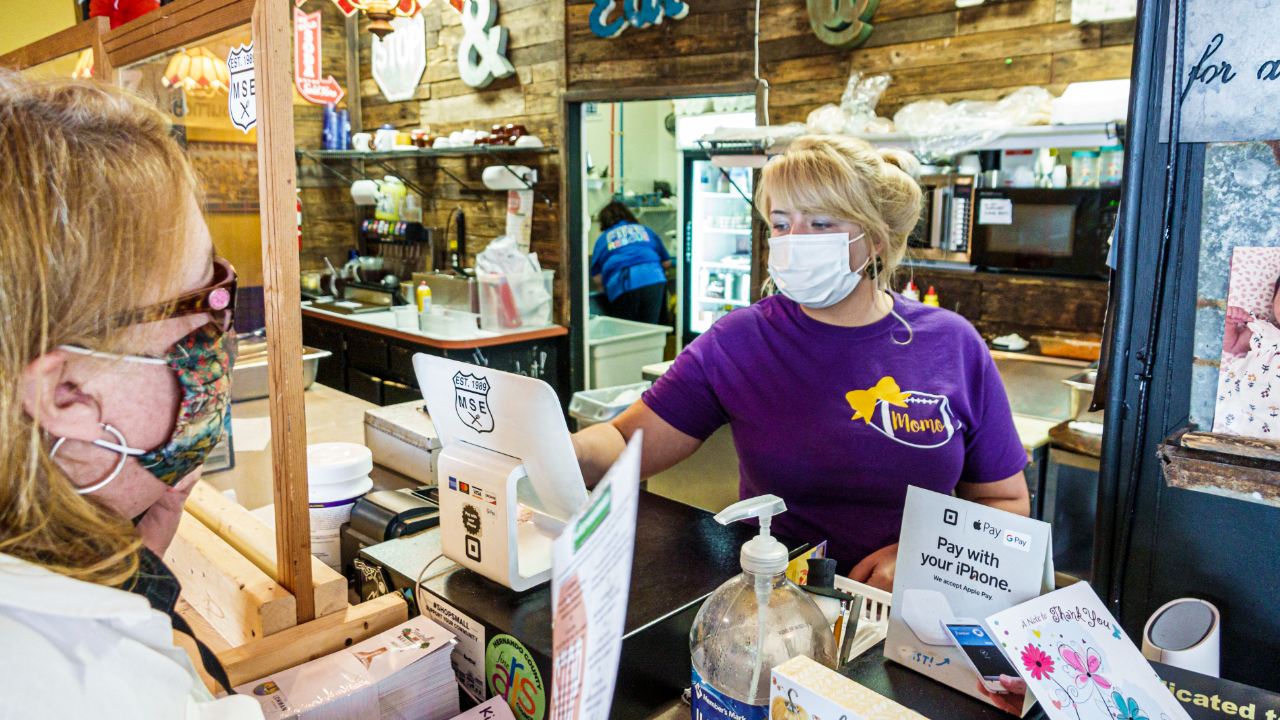Worried about your finances and job security beyond the pandemic? Here’s 7 steps to take

The coronavirus pandemic wreaked havoc on Americans’ wallets, and experts say the financial stress it caused could linger long after the outbreak eventually subsides — though how long exactly is too early to tell.
One indication: A Bankrate survey from September found that more than 3 in 5 Americans (or 63 percent) were concerned about their job or income source over the next six months, with close to a quarter of them (or 23 percent) being very concerned. Those workers were predominantly older millennials and Generation Xers, with a respective 71 percent and 72 percent reporting some level of concern — compared with 62 percent of younger millennials and 56 percent of baby boomers.
The majority of Americans are anxious even as an unprecedented number of workers are voluntarily leaving their positions, long seen as a sign of economic confidence. Workers are quitting especially more often in virus-impacted sectors where turnover is traditionally high, including food services, retail, and arts and entertainment. And although there’s no way to know for sure why workers are leaving, they’re believed to be job switching, thanks to employers’ simultaneous record demands for new labor.
What’s worrying Americans? The virus, Washington politics and inflation — among others
Yet, economists say the apprehension isn’t all that surprising. Americans in Bankrate’s September poll were worried about the virus’ impact on their wallet, along with several other secondary effects — from Washington gridlock and inflation, to stock market declines and unexpected increases in borrowing costs. Some workers just starting a new job might also feel like they have less leverage.
“Workers basically realize that you’re on fairly thin ice when you first start working, and you build that job stability over time,” says John Leer, chief economist for Morning Consult. “In industries where people experience higher levels of churn, what tends to happen when people go back to work is, people who are hired last tend to be the ones who are cut first.”
The pandemic illustrated that Americans can be knocked down in an instant by unforeseen events entirely out of their control. Yet, financial experts say there’s a solution to almost any problem, and it starts with focusing on what you can do: building up financial buffers.
Here’s seven steps you can take to help alleviate any worries about your job security or income in the near term.
1. Build up a cash cushion — any little bit will count
No one knows what the future holds. The best way to shore up your finances if you’re hit with unexpected expenses is to build up an emergency fund.
Experts typically recommend keeping about six to nine months’ worth of expenses stashed away in a savings account at all times. However, accumulating a pile of cash that large takes time. Remember that every little contribution helps. No amount of money that you put away in the bank is too small.
Consider automating these contributions into your account to make the process easier. Meanwhile, several financial applications out there can analyze your budget and help you figure out how much you can realistically set aside for savings.
“Whether an economic crisis, a quick flare-up of inflation, a natural disaster or a sudden costly expense, the focus should be on anticipating that something negative may and will likely arise at some point, even if we don’t know exactly what it will be,” says Mark Hamrick, Bankrate senior economic analyst and Washington bureau chief.
2. Limit your expenses by paying down debt
Limiting how much cash you have flowing out of your wallet will be crucial when emergencies strike. That includes trimming down your monthly debt obligations, which is often not unlike a monthly subscription or bill because that cost is recurring until it’s paid off. High-cost debt from things like credit cards or some personal loans are especially important to pay off.
Financial experts typically point to two popular methods to tackle debt. One is debt snowball, where you prioritize paying down the smallest loan balance first. Others recommend the debt avalanche method, where a borrower prioritizes paying off the debt with the highest interest rate first. Utilize Bankrate’s debt payoff calculators to help you determine which method might take you the longest to become debt-free.
“When you have income uncertainty, there’s not really a way to avoid the financial stress,” says Adrienne Ross, CFP, a financial counselor who founded the Washington state-based Clear Insight Financial Planning. “If you have low debt, few financial obligations and you have cash savings, then you’re really in a good position to handle whatever comes your way — whereas if you have lots of debt and very little savings, even the smallest hiccup can cause you a lot of stress and anxiety.”
3. Finalize your budget to make saving and paying down debt easier
One way to make having an emergency savings and no-debt lifestyle attainable: Make sure you’re living within your means and not going over your monthly budget.
Take a close look at your finances and see how much money you have flowing out each month. Then, compare that with how much money you should be saving each month.
Popular budgeting methods suggest that Americans should be stashing away at least 20 percent of their income. If that amount is currently impossible, see if you can identify ways where you can cut back to meet that goal. The easiest ways could be discretionary purchases such as subscription services, restaurants and shopping.
Yet, saving one-fifth of one’s income might be challenging, particularly for someone who lives paycheck to paycheck. Even so, the pandemic reminded many Americans that life is short, and that it’s important to still have things in your life that you enjoy.
Moderation is important, and any little bit that you can pull back on helps, especially if you’re in debt and have no emergency fund. And if there’s one good aspect of the pandemic, many Americans changed their lifestyles during lockdowns. One example: Ross says many of her clients ended up cooking at home more and learning to enjoy it.
“It seems like a simple thing, but think about controlling the controllable and living more frugally, about having financial buffers in our spending,” Ross says. “If we can save money by doing something that we also enjoy — like cooking — it’s kind of a win-win situation.”
4. Make an action plan for when emergencies do happen
Thinking about job or income loss is scary, but the best way to alleviate any stress if it does happen is by forming a game plan for when a crisis does hit. That often happens before any such emergency has occurred.
Who in your life can you reach out to if you’re having trouble affording your bills? What documents do you need to have on hand to easily apply for unemployment benefits? What lenders or financial firms do you regularly pay a bill to that you should inform if you unexpectedly lose part of your income? Can you take on a new, temporary job?
Making a list of places where you can turn to help boost your income and limit your expenses can help you feel like you’re not alone.
“There is a solution, and there’s always something we can do,” Ross says. “We’re focusing on finding a solution to the current situation, so that you can move forward and get back on track and minimize the damage of that period of time.” That often starts with not judging yourself for why you got into the emergency, she adds.
5. In tough times, remember it’s important to prioritize essential bills
Part of that game plan should be recognizing that some bills are more important to cover than others if you’re strapped for cash.
Housing costs, whether that’s a monthly mortgage or rent payment, are the most important because it means keeping a roof over your head. Utility payments are also essential, while food and groceries are necessities — though you can still benefit by shopping around in tough periods to make sure you’re getting the best deal possible.
Student loan borrowers can often work out a payment forbearance with their lenders in tough times, especially federal borrowers. And while high-cost credit card debt can accumulate over time, never choose paying more than the minimum payment if it means not being able to afford rent or food. Credit card companies might also have hardship policies that allow some Americans to pay less than the minimum payment in certain circumstances.
6. Negotiate for higher pay or find a job that meets your needs in today’s red-hot job market
Employers have been complaining about labor shortages for months now, meaning workers might have more power than they realize to negotiate for higher pay and hunt for a better position. Even though it might feel risky to be the new person on the job, economists say job-switching is the best way to increase your earnings potential — which would help address your income fears.
“Job-switchers tend to actually experience higher rates of wage growth over time than people who stay on the same job,” Leer says.
You might be surprised by how many industries have high job opening rates. In transportation, warehousing and utilities, 8.4 percent of jobs are empty, the third-highest of any sector, and 1.4 times as many people are quitting than usual, according to the Labor Department. In food services, 9.5 percent of jobs are open, while 8 percent are unfilled in health care and social assistance, and 7.8 percent are vacant in professional and business services.
You might find even more job openings by reaching out to your network. And if you’re hoping to stay at your own job, consider using this record demand as leverage to ask for a raise.
“This dynamic has shifted the balance of power into workers’ hands in a way that should help them to attain and or retain employment,” Hamrick says. “In some cases, seizing upon this opportunity may require changing jobs or even moving to a different kind of job. Still, a good number of workers may opt to remain with their current employer with the hope of promotion, better working conditions or pay raises.”
7. If higher prices are worrying you, refinance your mortgage and find inflation-hedging investments
A consequence of record demand as consumers venture out of their homes after lockdowns: Consumer prices in October soared by the fastest rate in 30 years. Supply constraints, whether that be of workers or goods, are impacting that picture — and if higher inflation is what’s making you feel concerned about your income over the near-term, experts point to steps that you can take to minimize the impact.
One possible option could be refinancing your mortgage. Rates have increased in recent weeks, though they’re still hovering near record lows, and a separate Bankrate survey from October found that 74 percent of homeowners hadn’t yet locked in a lower interest rate on their housing loan. Experts say refinancing is a key way to free up cash that could be used to accommodate for higher expenses in the face of inflation, with the move potentially saving you hundreds of dollars off of your monthly payment.
In a more long-term picture, you might also consider investing more and working some inflation-safe investments into your portfolio, from dividend-paying stocks and preferred stocks to real estate investment trusts and Treasury-Inflation Protected Securities (TIPS). Meanwhile, avoid leaving too much cash in fixed-income investments, such as bonds, which tend to be more sensitive to price increases.
Bottom line
Just because the U.S. economy appears to be in much better shape today than during the coronavirus lockdowns doesn’t mean Americans feel like times are less rocky. Americans should brace themselves for the possibility that some pandemic-induced anxieties might never go away. Yet, experts say the steps that Americans took to get through the worst of the crisis are ones they should be thinking about incorporating into their finances every day.
“As unfortunate and heartbreaking as the pandemic has been, it is something we can learn from,” Hamrick says. “The hope is that more individuals will seek to build emergency savings while also working to accomplish other financial goals to prevail through the next challenge, whether it is unique to their own lives or affecting a greater number of people.”
Learn more:
- How much is higher inflation hurting you? Here’s how to estimate
- Survey: Nearly half of economists say U.S. economy still faces considerable downside risks over next year
- Facing long-term joblessness? Try these 7 things if you’re struggling to find work
Why we ask for feedback Your feedback helps us improve our content and services. It takes less than a minute to complete.
Your responses are anonymous and will only be used for improving our website.






